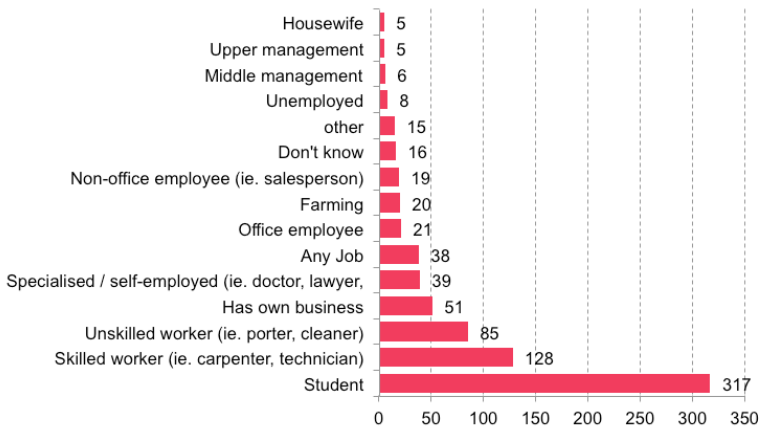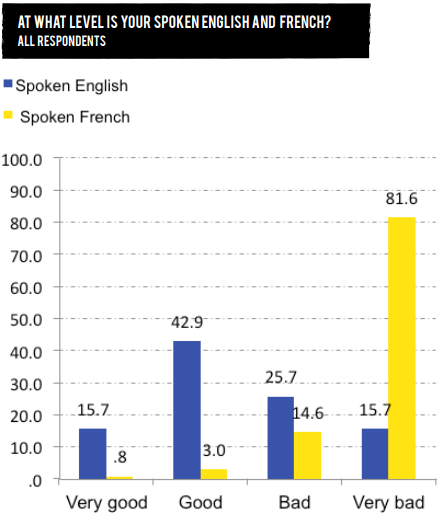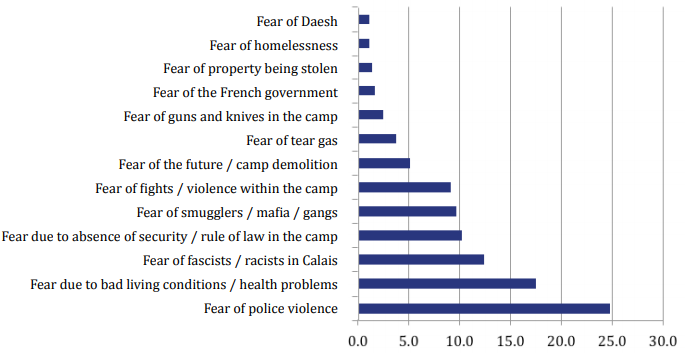I have been wondering about that for quite some time and I do not have any comprehensive answer but that fact is that migration routes are much more complicated than “poor people going to rich countries”.
There are many people from Africa immigrating to France as well, either with a student visa, family/spouse visa or some other way. Some of them might end up applying for asylum because they find themselves stuck with no other way to avoid removal. But most of these people do not usually come from the same countries as the people trying to reach the UK from Calais.
So it's not a case of migrants in general wanting to go to the UK or France. It's specific people (sometimes from the same country, sometimes not) who have specific strategies. And the number of people from, say, Algeria or Congo in Paris or Brussels might not struck a Sudanese as particularly comforting so it's not so surprising they would have different goals even if they are all from Africa.
Furthermore, the situation in Calais is particularly dramatic and visible but at any given time there are “only” 2-3000 people there. To get an idea of the scale, there are currently more than 1.5M citizens of various African countries living in France, perhaps 80000 new African immigrants (that's not a net change, just the count of those who got a “titre de séjour”) and 50000 asylum applications (from all nationalities, success rate is about 10%) every year. And Italy or Hungary cite figures in the tens or hundreds of thousands regarding illegal entries so only very few of these people end up in Calais.
Another way to look at this is to compare these numbers with requests made under the Dublin agreement. The Dublin agreement stipulates that the country most responsible for the entry of an asylum seeker in the EU must examine his or her application. Consequently if someone who entered through, say, Italy is found in France, France can request that Italy takes this person back and deals with their asylum application instead of France.
The system is clearly completely broken but still, there were about 50000 request a year in 2009-2012, a number that's an order of magnitude higher than the number of people in Calais. Those are also people who were in one European country but tried to reach another one. The only reason it's not as visible as the Calais situation is because it does not happen in any one place and those people are caught later out of the public sight, whereas the UK is only reachable through a handful of port of entries and still maintains full border checks so you see actual people standing there and trying to climb on lorries.
Finally, there is another peculiar aspect of French policy that might contribute to the situation. In France, thousands of people are in a sort of legal limbo, “non-expulsable” but “non-régularisable”. It means they cannot be removed (because their country is not safe, their consulate does not recognise them, etc.) but they cannot be granted a status (because their asylum application has been denied, they don't want to apply for asylum in France or they do not qualify for any other path to a legal status). Legally speaking, those people are supposed to leave the territory (e.g. they are under what's called an “obligation de quitter le territoire français”) but the police does not know what to do with them.
In some other countries, people in this situation can be detained indefinitely until a “solution” is found. In France, administrative detention (“rétention administrative”) cannot last more than 45 days (unless the person is linked with terrorism). That means that after 45 days, you find yourself on the streets, with absolutely no perspective at any sort of legal status in France but nobody physically stopping you from going to Calais and trying your luck there.
Some of these people might make it to the tunnel grounds, be detained by the UK border guards and returned to France or perhaps be arrested again in France, spend some time in a detention centre and then start the whole cycle again.
But beyond these generalities, it's interesting to read this report recently published by a local charity. It's based on 54 interviews with migrants in the area. A few salient findings:
- On average, they left their country 900+ days ago and spent 75 days in Calais.
- Most people did not initially plan to go to the UK but decided to do so during their journey.
- Half of them choose the UK based on advice they got “in their community”.
- Some of them said they tried to systematically select the place where their chances of success would be the highest, in particular because they already speak English.
- A third (the person writing the article suggests that's not a lot but it's not insignificant, especially considering the small sample size) have family or contacts in the UK and cite this as a factor.
According to this other press article about the same report, some people in Calais do not want to lodge any sort of formal claim in France (like an asylum application) because they know their fingerprints have been collected in Italy or Greece and they therefore fear they would be returned there (where the conditions are much poorer) rather than be allowed to stay in France. Technically, I think the same would happen in the UK but they are perhaps under the impression that going there would protect them from that fate.
Added October 2017: A recent report, also based on interviews in the area found that over 60% of the respondents cited a relative or acquaintance in the UK as a reason for wanting to go there instead of staying in France.


